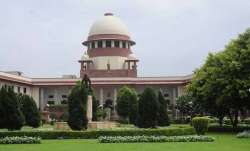'DNA does not evaporate' in inter-religion marriage, let woman attend father's last rites: SC tells Parsi body
Observing that she hasn't "surrendered her affection to father", the five judge constitution bench headed by Chief Justice Dipak Misra asked senior counsel Gopal Subramanium to speak to his client on permitting the petitioner to attend the funeral of

The Supreme Court on Thursday asked the Parsi Anjuman in Gujarat's Valsad to consider the plea of woman from the community - who has married outside the religion - seeking to attend the funeral of her father as and when he passes away.
Observing that she hasn't "surrendered her affection to father", the five judge constitution bench headed by Chief Justice Dipak Misra asked senior counsel Gopal Subramanium to speak to his client on permitting the petitioner to attend the funeral of her father in Anjuman.
Further observing that "DNA does not evaporates" after marrying outside the religion, the court said that the "marrying under the Special Marriage Act is only for the retention of original identity".
The Parsi woman has sought a declaration from the court that she would not be barred from attending the funeral of her father merely because she has married outside the religion.
Goolrokh M. Gupta, who married outside Parsi religion under the Special Marriage Act, has contended that merely by marrying outside her religion would not result in her excommunication from Parsi religious activities.
She had married a non-Parsi in 1991 and subsequently was denied entry into the Parsi temple of fire or allowed to participate in other rituals.
Gupta has challenged 2012 Gujarat High Court judgment which says that after marrying a person of another religion under the Special marriage Act, her identity would merge in the identity of her husband.
Besides Goolrokh, her sister Shiraz Rajiv Patodia too has moved the top court challenging the High Court verdict.
Shiraz said that her parents are in their 80s and both sisters wish they live long and healthy, but merely because both siblings had married outside the Parsi religion could not be a ground for not permitting them to attend the last rites in case of an unfortunate situation.
When the court said that if the Anjuman agrees to permit the petitioner to attend her father's funeral, then it would not proceed with the matter as then it would be of academic interest, Indira Jaising told the court that if the Sabrimala matter is referred to the constitution bench, then this too should be heard.
"You can't escape the issue in this case," Jaising told the constitution bench, which said: "Please understand we are not going to shirk our responsibility."
She told the court that in the case before the bench, the petitioners have knocked the doors of the court but there could be thousands of such women whose rights are denied and they are discriminated against.
The court directed the matter's next hearing on December 14.